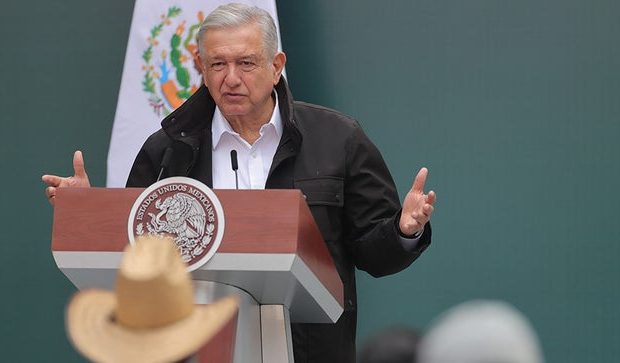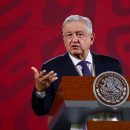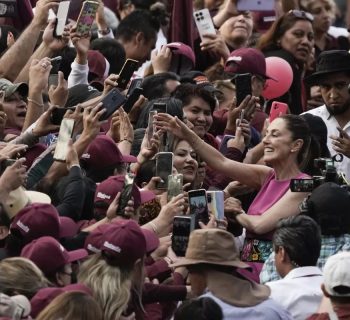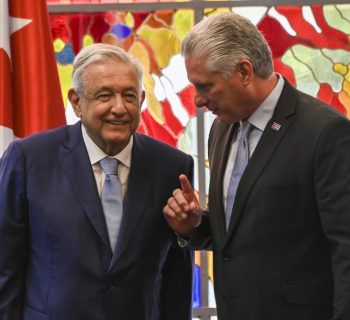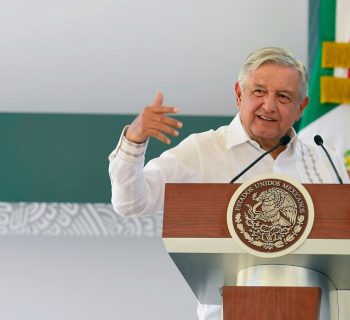BY: RAFAEL BERNAL , THE HILL – NOV. 9, 2020
Mexican President Andrés Manuel López Obrador has refused to recognize the results of the U.S. presidential election, foreshadowing an early foreign policy challenge for President-elect Joe Biden.
López Obrador, also known by his initials AMLO, said Monday his government will wait for official certification of election results before congratulating a winner, despite the fact that Mexican governments have historically recognized projected election winners in the United States.
"Joe Biden lawfully and clearly won this election. Every world leader should acknowledge this fact, including the president of our most important neighbor and ally, Mexico," said former Rep. Beto O'Rourke (D-Texas), a 2020 Democratic presidential primary contender whose name has been floated as a potential ambassador to Mexico in the Biden administration.
Canada, Mexico and China are the United States' top three trading partners. Of the three, only Canadian Prime Minister Justin Trudeau has publicly recognized and contacted Biden.
That puts López Obrador in strange company, joining autocrats like China's Xi Jinping, Russia's Vladimir Putin, Brazil's Jair Bolsonaro and Turkey's Recep Tayyip Erdoğan in holding back from congratulating Biden.
"It's disappointing to me that he would be in the ranks of Bolsonaro and Putin, claiming that legal issues have to be resolved and that they're holding back on congratulations," said Rep. Jesús García (D-Ill.), who as a young boy emigrated from Mexico.
"[It's] making us wonder if their reluctance is more of a matter of affinity toward Trump than 'respect for U.S. sovereignty,'" added García.
The Mexican president's tacit recognition of President Trump's false allegations of voter fraud drew the public ire of several Congressional Hispanic Caucus (CHC) members, including García, who in the past were privately critical of López Obrador's close relationship with Trump.
“President López Obrador’s decision not to recognize President-elect Biden was disappointing to members of Congress because we care deeply about the U.S.-Mexico relationship. We’re in the middle of a deadly global pandemic, and diplomatic cooperation with the government of Mexico is paramount. Our economies and millions of families are interconnected, and we’ll keep working to strengthen the relationship,” said Rep. Joaquín Castro (D-Texas), chairman of the CHC.
Rep. Filemón Vela (D-Texas), a close Biden ally who represents a strategic border district, said the decision “just proves what a sham of a president AMLO is, just as much of a sham as the Trump presidency."
"Trump's response to the election is totally undemocratic and AMLO by choosing this path just proves that he does not believe in democracy either. AMLO needs to right the course by acknowledging Biden’s victory and the legitimacy of our election," added Vela.
López Obrador's relationship with Trump has been tumultuous. As a presidential candidate, López Obrador wrote a book criticizing Trump. But as president, faced with the threat of steel and aluminum tariffs, he was forced to acquiesce to Trump's demands on immigration.
While López Obrador's positioning will almost certainly taint his relationship with the White House over the next four years, his decision is consistent with his own electoral history and political upbringing.
In 2006, López Obrador narrowly lost the presidency to former President Felipe Calderón and publicly expressed resentment of international figures who were quick to recognize Calderón's victory.
"It is wholly consistent with who he is and the way he interprets his loss in 2006, as well as his Westphalian — national sovereignty and nonintervention as paramount — view of foreign affairs," said Arturo Sarukhán, who served as Mexico's ambassador to the United States under Calderón.
From 1929 to 2000, Mexico was effectively a single-party state where the ruling Institutional Revolutionary Party (PRI) relied on its foreign policy of nonintervention as a bulwark against American criticism of its internal violations of human rights, including widespread electoral fraud.
López Obrador started his political career in the left-leaning social activist wing of the PRI, and he often relies on rhetoric and policy associated with the party's unique blend of populism and nationalism.
But López Obrador's attitude is likely not entirely based on his views of national sovereignty.
"While he's looking in the rear-view mirror he's also most likely looking forward, thinking he can insulate his political landscape from the world as he drives Mexico forward into next year's midterms and his passing of the torch in the 2024 elections," said Sarukhán.
While that insulation has historically been a main driver of Mexico's noninterventionist foreign policy — and a key pillar of López Obrador's own views of foreign affairs — the U.S.-Mexico relationship has become a story of growing economic and cultural integration over the past three decades.
The potential for a chilling effect between López Obrador and Biden might not slow that process — as a Trump administration didn't — but it could freeze any attempts to augment cross-border collaboration on everything from implementing the United States-Mexico-Canada Agreement (USMCA) to distribution of a coronavirus vaccine.
That López Obrador would take that risk, particularly as Mexico's economy has been ravaged by the pandemic, has perplexed some observers of the bilateral relationship.
"I am sure the López Obrador administration seeks to establish a good relationship with a Biden administration. The president’s decision puzzles me and I believe it is mistaken," said Gerónimo Gutiérrez, who served as Mexico's ambassador to the United States from 2017 to 2018, as the USMCA was being negotiated.
"It does not appear to be something sanctioned by [the] Foreign Affairs [Secretariat]. I expect Biden is very busy with other things, but some mending will likely be needed with his team and Democrats on the Hill,” added Gutiérrez.
While López Obrador's position on the U.S. election can be perceived as a diplomatic misstep — Castro called it "a stunning diplomatic failure" — it does come at a time when Biden's inner circle is focused on the transition and the pandemic and is less likely to react to the Mexican slight.
"Joe Biden understands the strategic importance of a constructive and synergistic relationship with Mexico," said Sarukhán. "He will most likely seek to go forwards, not backwards, in rebuilding the key tenets of one of the most important bilateral relationships for the prosperity and security of Americans."
Rep. Andy Levin (D-Mich.), a potential Biden pick for secretary of Labor, gave López Obrador the benefit of the doubt, saying there are "vast differences between AMLO and the likes of Putin and Bolsonaro, so I wouldn’t put them in anywhere close to the same category of world leader."
"AMLO’s refusal to recognize the results of the election may reflect a desire to keep our relationship stable through the lame-duck period. I think that says more about the volatility and instability of Trump and his administration than it does about AMLO," added Levin.
Still, Levin said he hopes the Biden administration will push for strict enforcement of the USMCA's labor chapter, a move that could threaten López Obrador's power base.
"The Biden administration will have an opportunity to breathe real life into this still-new agreement and to hold Mexico accountable for its labor reform promises. President-elect Biden will be proactive in bringing cases under the new enforcement mechanism and supporting Mexico’s efforts to transform its labor system to include truly independent, democratic unions," said Levin.
And Trump allies say López Obrador is being properly cautious, doubling down on Trump's argument that the election is still undecided.
"Mexico has always been very, very cautious about the way it approaches its relationship with the United States because we're next-door neighbors and that has a certain level of importance that requires you to be precise," said Sergio de la Peña, a Trump surrogate and former military officer who served as deputy assistant secretary of Defense for Western Hemisphere affairs under Trump.
"Guys like AMLO know you don't want to start congratulating anybody until it's made official," said de la Peña. "Those people that are congratulating prematurely will look very silly if the election goes back to President Trump."
Still, López Obrador's attitude has at the very least angered the CHC, a strategic group in the bilateral relationship both because its members in the upcoming Congress will represent six of the nine districts bordering Mexico and because the group as a whole is influential in the Mexican American community.
And that group was already angered by López Obrador, who during the presidential campaign made the only foreign trip of his presidency to visit Trump in the White House for a USMCA signing ceremony, eschewing any contact with the Mexican American community.
Rep. Verónica Escobar (D-Texas), who is running to be the next CHC chair, said cross-border collaboration will be essential to ending the pandemic, particularly in high-traffic areas like El Paso, the city she represents, across the Rio Grande from Ciudad Juárez.
But Escobar said that collaboration could be slowed by starting off with the Biden administration on the wrong foot in the wake of López Obrador's "subservience" to Trump's threats.
"Being subservient to a bully does not make you a leader, and that's essentially what [López Obrador] did," said Escobar.
"No doubt Donald Trump bullied Mexico and threatened Mexico, but in the face of that what President López Obrador owed his country and the vulnerable migrants in his care, he owed them leadership," she added.
BY: RAFAEL BERNAL , THE HILL – NOV. 9, 2020

